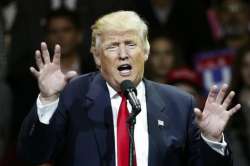Trade war: US President Donald Trump approves 25% tariff on Chinese goods, Beijing vows to retaliate
Asserting that the "very unfair" situation is "no longer sustainable", Trump, in a statement said a 25 per cent tariff will be applied to Chinese goods that “contain industrially significant technologies.”

In a move that can raise the possibility of a trade war between the US and China, President Donald Trump on Friday announced stiff tariffs of 25 per cent on Chinese goods that will have impact on Chinese imports worth $50 billion.
Asserting that the "very unfair" situation is "no longer sustainable", Trump, in a statement said a 25 per cent tariff will be applied to Chinese goods that “contain industrially significant technologies.”
The administration was expected to specify the goods later in the day.
Trade between the two countries “has been very unfair, for a very long time,” Trump said, adding that “this situation is no longer sustainable.”
The US says its tariffs on Chinese goods are in response to what it categorises as theft of intellectual property.
Trump’s approval to impose tariffs on Chinese exports followed a 90-minute meeting he had with Commerce Secretary Wilbur Ross, Treasury Secretary Steven Mnuchin and US Trade Representative Robert Lighthizer yesterday.
Reacting to Trump’s latest move, China has vowed to immediately retaliate.
“If the US side adopts unilateral protectionist measures and damages China’s interests, we will immediately react and take necessary measures to firmly safeguard our legitimate rights and interests,” said China’s foreign ministry spokesman Geng Shuang during a regular news briefing in Beijing.
China was also scrapping deals to buy more American farm goods and other exports as part of efforts to defuse a sprawling dispute over its trade surplus and technology policy, the Commerce Ministry said in a statement.
“The Chinese side doesn’t want to fight a trade war, but facing the shortsightedness of the U.S. side, China has to fight back strongly,” the statement said.
“We will immediately introduce tax measures of equal scale and equal strength, and all economic and trade achievements reached by the two sides will be invalidated,” it added.
China had previously said it would respond to American tariffs on USD 50 billion worth of Chinese exports with retaliatory tariffs on USD 50 billion of US products such as cars, aircraft and soybeans.
Trump’s first announced that the US would impose trade penalties on about USD 50 billion of Chinese goods in March.
After China warned it would retaliate, Trump threatened tariffs on a further USD 100 billion of Chinese products.
In mid-May, both sides announced a cease-fire after two rounds of trade negotiations. The countries said in a joint statement that China would “significantly increase” purchases of US agricultural and energy products to reduce the trade imbalance, a top Trump administration demand.
Ten days later, the White House abruptly said it would proceed with the tariffs.
A further round of trade talks in Beijing earlier this month failed to yield any breakthroughs.
President Trump’s decision to impose fresh tariffs on China follows his recent imposition of steep tariffs on steel and aluminum imports from Canada, Mexico and the European Union on national security grounds.
Those penalties have been met with consternation by world leaders, and led to a fraught G7 meeting with Canada, France, Germany, Italy, Japan and the United Kingdom last weekend.
The European Union and Canada have said they will enact retaliatory tariffs starting in July. Mexico has already retaliated with its own tariffs on US goods.
International Monetary Fund chief Christine Lagarde yesterday warned that the Trump administration’s trade policies were likely to hurt the US economy and undermine the world’s trade system.
She said a trade war would lead to “losers on both sides” and could have a “serious” impact.
(With PTI inputs)